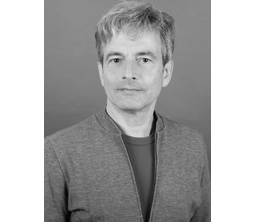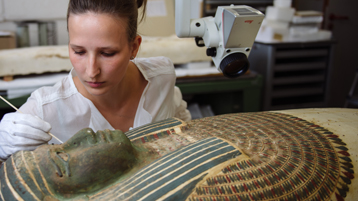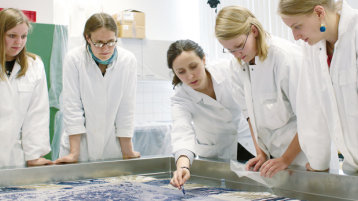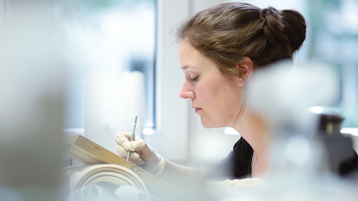International Symposium: How do you do it? Embodied Knowledge in Contemporary Art Conservation
Symposium , 21. Juni 2024
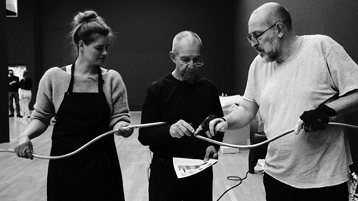
Bringing together experts from an array of disciplines, the symposium aims to refine the understanding of concepts such as tacit, procedural, and embodied knowledge. Participants will delve into the functioning of embodied knowledge and share experiences and best practices for intergenerational and interdisciplinary transmission to support the longevity of complex contemporary artworks.
Auf einen Blick
International Symposium: How do you do it? Embodied Knowledge in Contemporary Art Conservation
SymposiumWann?
- 21. Juni 2024
- 09.00 Uhr bis 18.00 Uhr
-
in meinen Kalender übertragen
BEGIN:VCALENDAR VERSION:2.0 PRODID:-//hacksw/handcal//NONSGML v1.0//EN CALSCALE:GREGORIAN BEGIN:VTIMEZONE TZID:EUROPE/BERLIN BEGIN:DAYLIGHT TZOFFSETFROM:+0100 TZOFFSETTO:+0200 TZNAME:CEST DTSTART:19700329T020000 RRULE:FREQ=YEARLY;BYMONTH=3;BYDAY=-1SU END:DAYLIGHT BEGIN:STANDARD TZOFFSETFROM:+0200 TZOFFSETTO:+0100 TZNAME:CET DTSTART:19701025T030000 RRULE:FREQ=YEARLY;BYMONTH=10;BYDAY=-1SU END:STANDARD END:VTIMEZONE BEGIN:VEVENT LOCATION:HAWK\, Aula\, Hohnsen 2\, Hildesheim DESCRIPTION: SUMMARY:International Symposium: How do you do it? Embodied Knowledge in Contemporary Art Conservation DTSTART;TZID=EUROPE/BERLIN:20240621T090000 DTEND;TZID=EUROPE/BERLIN:20240621T180000 DTSTAMP:20260221T080525 UID:699959359d447 END:VEVENT END:VCALENDAR
Wo?
HAWK, Aula, Hohnsen 2, Hildesheim
HAWK Hildesheim
Anmeldung
Embodied knowledge refers to the tacit understanding residing within the body that enables us to perform and refine tasks without having to consciously consider every step of such actions.
In the context of complex artworks, which often incorporate technology-based or performative components, this knowledge is embedded in the artist’s vision, developed and fine-tuned throughout their career, and transferred often implicitly to their assistants through years of experiencing the artist’s creative process.
Custom-made devices, unique installation techniques, and aesthetic preferences define the artwork. However, these individualised tweaks tend to defy traditional forms of documentation, thus raising the question: How can we impart embodied knowledge to others effectively?
Experts from an array of disciplines
Bringing together experts from an array of disciplines, the symposium aims to refine the understanding of concepts such as implicit, tacit, procedural, and embodied knowledge.
Participants including linguists, sociologists, conservators, artists, artist’s assistants, art historians, curators, and representatives of artists’ estates will explore the functioning of embodied knowledge and share experiences and best practices in intergenerational and interdisciplinary transmission.
The symposium will address crucial questions concerning the transmission of knowledge in several key scenarios:
- How can we bring implicit and embodied knowledge into awareness so as to make it accessible and transferable?
- What approaches can ensure a continuing transfer of knowledge to future generations in a way that extends beyond the artist-assistant relationship to include conservators and institutions?
- Once a complex artwork enters an institution, the transfer of knowledge necessary for its survival also needs to be enabled across different departments, including curation, conservation, and archiving. What are the obstacles to the flow of knowledge in this context?
- Knowledge is not always shared without hesitation. What motivations may different stakeholders have, and why might they be reluctant to share knowledge?
Training future practitioners
Furthermore, training future practitioners in the field of contemporary art preservation in the process of reinstalling complex artworks is a prerequisite for their longevity and for managing change with sensitivity.
Given the sheer number of unique artists’ installations, which are deeply reliant on techniques developed within their studios, as well as on specialised tools and refined procedures, it seems unrealistic to expect future conservators and other professionals to master every technique and process.
We therefore need to identify and provide training in the adaptable skills that are essential for dealing with a wide array of artistic challenges:
- What forms of knowledge are necessary to equip new generations to support the longevity of such complex artworks?
- What kinds of educational frameworks and hands-on experiences are best suited to transferring this knowledge?
The research project ‘Legacies of Artists’ Studios’
This event marks the launch of the research project "Legacies of Artists' Studios (LAS): Sharing and Archiving Embodied Knowledge for the Conservation of Technology-Based Artworks."
The project is a collaboration between Cologne Institute of Conservation Sciences | TH Köln, HAWK University of Applied Sciences and Arts in Hildesheim and Wüstenrot Stiftung in cooperation with Università Vita-Salute San Raffaele in Milan, Museum Ostwall im Dortmunder U, Künstler:innenarchiv der Stiftung Kunstfonds in Puhlheim, artists’ studios and freelance conservators.
Confirmed Speakers
Oliver Ehmer (Osnabrück), Agathe Jarczyk (New York), Mischa Kuball (Cologne), Hélia Marçal (London), Diego Mellado Martinez (Madrid), Martina Pfenninger Lepage (Bern), Francesca Pola (Milan), Christoph Rausch (Maastricht), Jochen Saueracker (Düsseldorf), Anna Schäffler (Berlin), Christian Scheidemann (New York), Elena Engelbrechter, Artemis Rüstau (Wolfsburg).
Location: HAWK, Aula, Hohnsen 2, Hildesheim
Conference language: English
Conference committee:
- Prof. Dr. Tiziana Caianiello (Faculty of Architecture, Engineering and Conservation, HAWK Hildesheim)
- Prof. Dr. Gunnar Heydenreich (Cologne Institute of Conservation Sciences, TH Köln)
- Julia Giebeler (Cologne)
- Mareike Opeña (New York)
- Prof. Dr. Francesca Pola (ICONE – European Research Center of History and Theory of the Image, Università Vita-Salute San Raffaele, Milan)
- Organisation: Sandy Bruer, HAWK
Participation is free of charge. Limited seats. Binding registration is required via email by 31 May 2024 at: sandy.bruer@hawk.de

